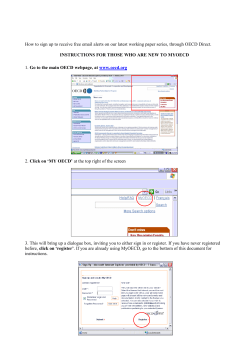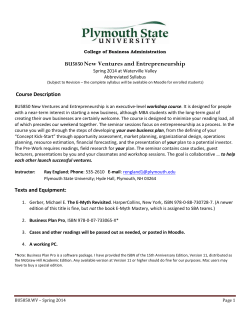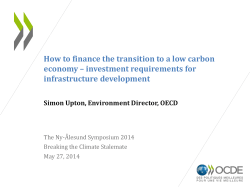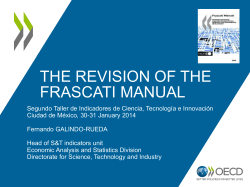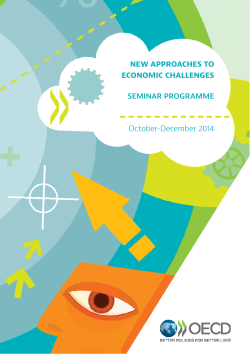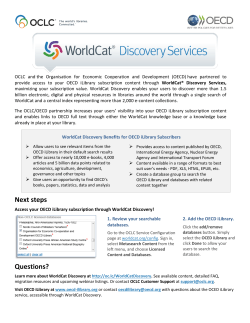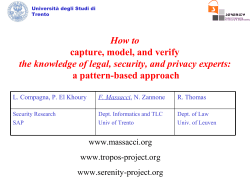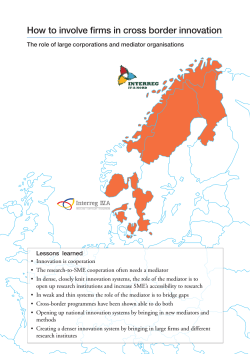
Document 204920
Organisation for Economic Co-operation and Development Local Economic and Employment Development Programme SUPPORTING SMEs IN A TIME OF CRISIS: HOW TO CHOOSE THE RIGHT ACTIONS A Capacity Building Seminar for Policy Makers and Local Development Practitioners 12-15 October 2009, Trento, Italy Organised by: The OECD LEED Trento Centre for Local Development and The International Cooperation Training Centre of the Autonomous Province of Trento (Italy) 1. Background: Small and medium-sized enterprises are key sources of dynamism, innovation, and flexibility. In OECD countries they account for over 95 percent of enterprises, generate two-thirds of employment and are one of the main sources of new jobs. Governments play an important role in stimulating more and stronger business start-ups, and in enabling companies to modernise and grow. They set the environment and policy framework in which new and small firms operate. In developing and transition economies, SMEs are key economic actors in resource allocation and industrial restructuring processes. They provide economic benefits, such as experimentation and adaptability to economic change and the growth of human capital. Governments have a three-fold role in turning initial stages of entrepreneurship development into employment and economic growth. This involves i) enhancing the conversion of informal entrepreneurship into formal businesses; ii) providing growth and innovation support for companies and startups; and iii) addressing skills bottlenecks. To implement an entrepreneurship agenda, national governments will need to partner with local governments, the private sector, and civil society organisations. In finding out what works best and where the likely pitfalls are, much can be learned from OECD countries, Latin America and transition economies. 2. Organisers: The OECD LEED Trento Centre: The mission of the OECD LEED Trento Centre is to build capacity for local development among national and local stakeholders in OECD member and nonmember economies. The Trento Centre builds on the OECD Local Economic and Employment Development (LEED) Programme’s longstanding commitment to providing assistance in the design, implementation and assessment of local development strategies and its expertise on entrepreneurship and small business development, employment and skills, local governance, social inclusion and evaluation. The Trento Centre supports exchanges between member and nonmember economies, between national and local organisations, and between the OECD and sub-national bodies. The Trento Centre provides capacity-building seminars, issues pedagogical materials, delivers country reviews and organises seminars and conferences. The International Cooperation Training Centre: The International Cooperation Training Centre (ICTC) is a newborn organisation for education, research, and training of high-qualified human resources engaged in social, institutional and economic cooperation, as well as local development promotion worldwide. A partnership focused and bottom-up oriented approach, conceived in its different social, political, and economical dimensions, is the main attention of the Centre. The Centre works on the capacity development of organisations and institutions both in the public and private sector, aiming at reinforcing projects, programmes and development policies, managing skills, providing courses as well as training, research and debate opportunities among different stakeholders and in different theme-based areas. In relation to the “Inclusion, Markets, and Social Equity” field, the ICTC aims to strengthen enterprise development by training innovation managers and experts. Central attention is paid to network features, strengths and weaknesses of local systems, actors’ attitudes to joint actions, and developing trends in the building of 2 partnerships among public institutions, private economic actors, and the academic field. The perspective in which the International Cooperation Training Centre implements its action is that of an innovative and challenging approach to local development based on local, regional, and transnational partnerships. 3. Target Countries: Central East and South East Europe: Bulgaria, Croatia, Former Yugoslav Republic of Macedonia, Hungary, Romania, Serbia, Slovenia. Latin America: Argentina, Brazil, Chile, Colombia, Ecuador, Mexico, Peru. 4. Participants’ Profile: In order to ensure a dialogue between national and sub-national stakeholders in the entrepreneurship field, two participants will be selected in each country between representatives of: o National, regional and local governments; o Business forums, e.g. chambers of commerce, trade federations, SME agents; o The education and training sector; o Local and regional development agencies. 5. Seminar Contents: The Seminar will build your knowledge on: 1. Supporting SMEs in a time of crisis: how to choose the right actions. Open session for policy makers and practitioners to review the impact of the crisis on SMEs and to discuss the emerging policy solutions. It will include dissemination and discussion of the results of work of the OECD LEED Programme on how local development policy can respond to the crisis and on how governments are responding to the crisis of SME and entrepreneurship financing (the Turin Round Table). 2. SME needs and policy responses: a selection of business support instruments, the problems they address, and how they are delivered: a. New start-ups: fostering entrepreneurial activities – The local determinants of enterprise creation – Building entrepreneurial and entrepreneurship capacities. Which approaches? – Start-up promotion. What role for universities, local governments and development agencies and the public sector? – Accompanying entrepreneurs from start-up: Tools and mechanisms (business incubators, business support agencies, etc) b. Addressing the SME finance gap and the role of co-operative banking – SME access to finance and the nature of finance gap – Instruments that help: venture capital, business angels, mutual guarantee schemes, loan guarantees, micro-finance instruments – SME finance in rural areas – Co-operative banking and micro-credits – Remittances as a lever for economic development c. Supporting SME growth, productivity and innovation – Stimulating innovation and internationalisation: local approaches to modernise and diversify SMEs 3 – – – Business networks and cluster development Creating a local skills base that meets business needs (local approaches to dovetail curricula development to local business needs) Building Capacity (or Training and Skills Development) in SMEs through Knowledge Intensive Service Activities (KISA) 3. Supporting social enterprises and local communities – The role of social enterprises – Working with the community (trust) 4. Creating entrepreneurship and SME strategies – Setting objectives and priorities – Integrating actions – Involving stakeholders – Creating an evidence base 6. Seminar structure: The capacity building seminar will last for 3.5 days and will be based on a mix of short presentations by OECD and international experts followed by discussion, group work around practical case studies developed by participants and trainers prior to the seminar, and group work exercises. 7. Study visit to The programme includes study visits to Trentino entrepreneurship and SME Trentino: development initiatives to view instruments used in the Province of Trento and considered as good practices by the OECD. This will enable participants to develop a greater understanding of applied policies and tools. In the past Trentino has been an area of emigration (above all towards Latin America). However it is now one of the wealthier regions in Europe, with a high standard of living and wellbeing, and, in its turn, is attracting immigration from both inside and outside the European Union. The region hosts well performing industrial activities, craft industries, and one of the most large and developed systems of co-operatives in Italy (including the credit, consumer or services sector). An additional day (Friday 16 October) will be devoted to the organisation of bilateral meetings for delegates and Trentino institutions and initiatives to facilitate the exchange of experiences between policy makers and practitioners. A full list of institutions will be made available at a second stage. 8. Working Language: The working language of the seminar will be English and it is essential that all participants have a good understanding of English. 9. Cost of Participation: The following costs of participation are covered by the organisers: o o o Tuition and training materials. Accommodation and lunches. Study visits to relevant organisations in the Autonomous Province of Trento. The organisers cannot cover costs of travel between the participant’s home country and Trento, or medical care and insurance during the stay in Italy. 10. Applications: National/regional policy-makers will be nominated to the organisers by the competent ministry/government agency by Monday 13 July 2009. Nominees should send their curriculum vitae to roberto.chizzali@oecd.org or by fax (+39.0461.277650) no later than Friday 17 July 2009. Programme leaders (SME/business associations, regional development agencies, 4 chambers of commerce, public financing schemes, inter-firms networks and clusters, business incubators, etc.) selection will be competitive, based on their application. This should include: o a duly completed Case Study Form; o curriculum vitae. Applications should be sent by email to roberto.chizzali@oecd.org or by fax (+39.0461.277650) no later than Friday 17 July 2009. Applicants will be notified within the following two weeks. 11. Contact Details: For further information, please contact: Ms. Alessandra Proto Policy Analyst OECD Organisation for Economic Co-operation and Development OECD LEED Trento Centre for Local Development 1, Vicolo San Marco 38100 Trento - Italy Phone: +39 0461 277-600 or 602 (ext.) Fax: +39.0461 277-650 e-mail: Alessandra.Proto@oecd.org http://www.trento.oecd.org Mr. Corrado Gentilini International Cooperation Training Centre 1, Vicolo San Marco 38100 Trento - Italy Phone: +39 0461 263-636 Fax: +39 0461 261-395 e-mail: corrado.gentilini@gmail.com 5
© Copyright 2025
